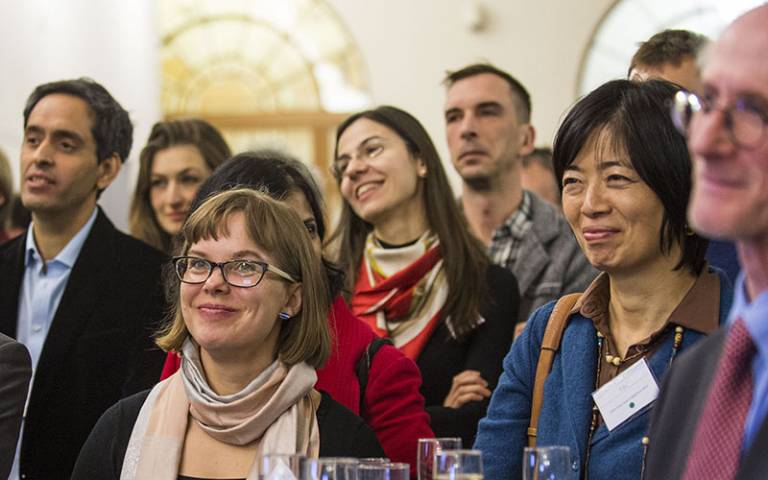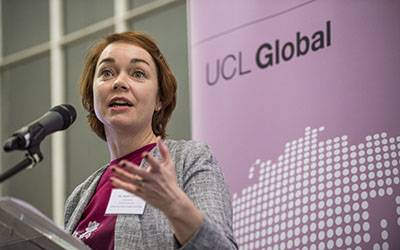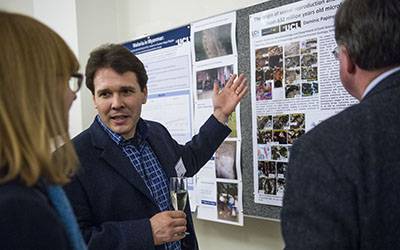Global Engagement Funds: Celebrating UCL's international collaborations
30 November 2016
Academics and staff gathered to celebrate the inaugural year of the Global Engagement Funds.

More than 120 UCL academics and staff gathered to celebrate the range of international collaborations supported by the inaugural year of the Global Engagement Funds.
UCL President and Provost Professor Michael Arthur, Vice-Provost International Dame Nicola Brewer and Pro-Vice-Provosts International Professor Gudrun Moore and Dr Karen Edge hosted an evening reception where this year's applicants could meet last year's recipients and learn more about how they used the funds.
During 2015/16, £290,000 was distributed through the funding to support 114 UCL academics across 75 departments, collaborating with 186 partners in 57 countries worldwide.
UCL's Vice-Deans (International) and Pro-Vice-Provosts (Regional) - who play a key role in distributing the funds – also attended the reception.
Professor Arthur said he was "incredibly proud and grateful" to UCL's academics for their work in reaching out and developing interdisciplinary global partnerships, with organisations ranging from research and higher education institutions, to businesses, governments and NGOs.
Accelerating activity
Formerly known as Sea and Currents funding, the Global Engagement Funds are a stream of seed funding (usually up to £2k) for academics to stimulate, facilitate and accelerate activity with global partners.
Speakers from diverse fields presented how the funds had made a difference to their new or existing international collaborations, where face-to-face meetings had led to longer-term activity - from submitting larger funding bids to producing joint academic publications.
Dr Sarah Crafter, Senior Research Officer at UCL Institute of Education's Department of Social Science, explained how she and Dr Rachel Rosen were able to carry out exploratory research into unaccompanied child migrants in 'the Jungle' refugee camp in Calais.
Their visit led to a deeper collaboration with the Unofficial Women and Children's Centre, with whom they hosted a workshop with additional partners this month.

Dr Crafter said: "Despite extensive media coverage about the plight of children living in ‘the Jungle’, little was known about their everyday realities.
"This funding was essential for the development of relationships between ourselves and different partners.
"We started to bring together partners from areas including law, foster care and social work and developed a workshop where we explored all the issues that we felt were important. We want to look at the state responsibility and explore the children's sense of agency in navigating new networks of care."
Dr Jenevieve Mannell (UCL Institute for Global Health) developed a joint grant proposal with the University of Rwanda for research into the prevention of gender-based violence, while Professor Monica Lakhanpaul (UCL Great Ormond Street Institute of Child Health) and her team established a partnership with not-for-profit SNEHA (Society for Nutrition, Education and Health Action) in India.
Professor Lakhanpaul thanked the Global Engagement Office for its support and said: "This shows how a little bit of funding goes a very long way."
Vice-Dean International for Medical Sciences, Professor Claudia Mauri, told how she was able to arrange a group faculty visit to the Weizmann Institute of Science, Israel, to establish long-term collaboration in the areas of autoimmune disease, inflammation, infection, immunity and cancer.
Many other fund recipients submitted posters about their work to be used during the event's networking session.
Intensifying engagement

Nicola Brewer explained the funding complemented existing support available, such as the Santander Universities Research Catalyst Awards; both important resources enabling UCL to intensify its global collaborations.
She said: "During the consultation period for the Global Engagement Strategy, academics across UCL were clear about the value of international collaboration - and how much time and money it takes to have those face-to-face meetings."
She added that of all the projects supported, one third of those were linked to Europe, highlighting UCL's continuing commitment to its European partners.
 Close
Close

